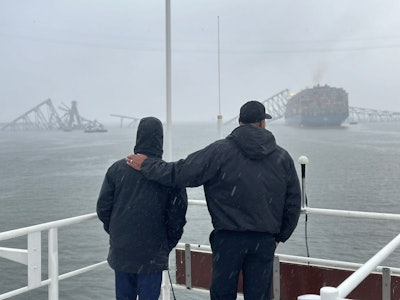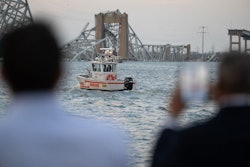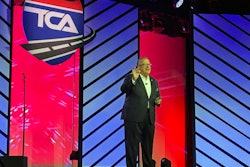
The Baltimore Port has been closed to ship traffic for more than two days, prompting ocean carriers to seek services at other points along the East Coast.
Baltimore is the third largest port for the import/export of construction equipment and is the largest import/export site for farm equipment and finished passenger vehicles in the country. However, it's the 13th largest container port, isolating the impact of its temporary closure to a few niche segments (flatbed, auto transport, heavy equipment and bulk minerals) that flow into and out of Charm City. Any downstream effects on the wider trucking market are unlikely.
"For the bulk of the market, I do not think that a temporary closure – or even a longer-term closure, frankly – of the port will have much effect other than some logistical hassles or additional road transport to alternate ports," said Avery Vise, vice president of trucking for FTR Transportation Intelligence, adding that either way, "that’s basically a local issue."
Almost 5,000 trucks daily crossed the Francis Scott Key Bridge, which was struck by a container ship in distress during the pre-dawn hours Tuesday and crashed into the Patapsco River seconds later, presumably killing six construction workers.
The biggest indirect consequence to otherwise unaffected carriers is likely to be traffic congestion, again, localized to the immediately affected areas – namely the now missing 1.6 mile section of Interstate 695.
"But I doubt there would be enough volume in a concentrated area to move the needle," Vise said. "Moreover, other truckers likely could navigate around bottlenecks. There might be some reduced freight volume due to closure or greatly reduced activity of businesses that depend on port operations for commerce, but that would not have a meaningful impact for a carrier unless one or more of those businesses happens to be a major customer."
Any of the delays would likely easily be absorbed by excess capacity already in the truckload market, said DAT Freight & Analytics Principal Analyst Dean Croke.
Of benefit, too, is the sudden shift in freight comes at a time that other ports can handle the unexpected influx.
"If you look at the six vessels that were due this week; two went to Norfolk and four went to New York City," Croke said. "We're at the low point on the import shipping calendar."
The consequences of Tuesday's tragedy locally – which Transportation Secretary Pete Buttigieg pegged at 8,000 jobs that rely on the port and its activities, and more than $100 million in cargo going through the port every day – will be significant in the undetermined number of weeks ahead, but Croke said there will be an urge to return freight flows to their normal patterns as soon as Baltimore reopens to vessel traffic.
"Geography plays a huge part of this. Why would you want to go further south to a smaller port like Norfolk or maybe Savannah," Croke said, "or run into traffic problems in New York – 150 miles farther inland – if you're pulling freight out to John Deere's headquarters in Quad Cities?"
Baltimore, Croke added, is also one of the few ports with enough space to handle large roll-on/roll-off vessels, making itself a vital part of those supply chains.
"If you look on Google Maps or Google Earth at the Dundalk Marine terminal, you see nothing but Case, New Holland, Volvo Construction Equipment, John Deere ... You can see the excavators," Croke said. "Just the amount of space there is key to store all the cars and trucks, and I think that's why people are deeply integrated into that part of the country. From a supply chain perspective, they aren't going anywhere. Sure, temporarily they may have to but not long term. I don't know how soon, but as soon as the channel reopens, you'll see [roll-on/roll-off] ships coming back in and container ships coming back in pretty quickly."










